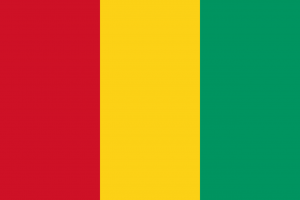Difference between revisions of "Language/Susu/Vocabulary/How-to-Say-Hello-and-Greetings"
< Language | Susu | Vocabulary
Jump to navigation
Jump to search
m (Quick edit) |
m (Quick edit) |
||
| (14 intermediate revisions by 3 users not shown) | |||
| Line 1: | Line 1: | ||
<div class="pg_page_title">🤗 '''Susu''' Greetings for Everyday Life</div> | |||
[[File:greetings-say-hello-polyglot-club.png|thumb]] | [[File:greetings-say-hello-polyglot-club.png|thumb]] | ||
[[File:Susu-Language-PolyglotClub.png|thumb]] | |||
Hi Susu learners! 😃 | Hi Susu learners! 😃 | ||
The Susu language (or Soussou in French) is the language of the Susu or Soso people of Guinea and Sierra Leone, West Africa. It is a national languages of Guinea and spoken mainly in the coastal region of the country. | |||
Greetings are an important part of any language because they allow you to connect and communicate with others. | Greetings are an important part of any language because they allow you to connect and communicate with others. | ||
If you’re planning a trip to | If you’re planning a trip to West Africa or are trying to learn Susu, keep reading to discover some of the most important greetings. | ||
Let’s get started! 🤗 | |||
<span link>Take a moment to explore these relevant pages as you conclude this lesson:</span> [[Language/Susu/Vocabulary/Family|Family]], [[Language/Susu/Vocabulary/Body-Parts|Body Parts]], [[Language/Susu/Vocabulary/Expressions-and-Questions|Expressions and Questions]] & [[Language/Susu/Vocabulary/Marital-Status|Marital Status]]. | |||
__TOC__ | __TOC__ | ||
==Greetings== | ==Greetings== | ||
| Line 25: | Line 21: | ||
|general greeting spoken to one person | |general greeting spoken to one person | ||
| | |In-you-wali | ||
|- | |- | ||
| Line 87: | Line 83: | ||
|Tana yo mu fenyen | |Tana yo mu fenyen | ||
|- | |- | ||
|morning | |||
|Gesege | |||
|- | |||
|Good morning | |||
|I kena | |||
|- | |||
|Did you spend the night without misfortune? | |||
|Tana mu xi? | |||
|- | |||
|Did you spend the night in peace? | |||
|Heri xi? | |||
|- | |||
|Not any misfortune. | |||
|Tana yo mu xi | |||
|- | |||
|And you? | |||
|I tan go? | |||
|- | |||
|Afternoon | |||
|Yanyi | |||
|- | |||
|Good Afternoon | |||
|I feyen | |||
|- | |||
|Did you spend the day without misfortune. | |||
|Tana mu feyen? | |||
|- | |||
|Did you spend the day in peace? | |||
|HEri feyen? | |||
|- | |||
|Not any misfortune. | |||
|Tana yo mu feyen. | |||
|- | |||
|Evening. | |||
|Nunmare | |||
|- | |||
|Night | |||
|kçe | |||
|- | |||
|Good evening | |||
|I nunmare | |||
|- | |||
|How are you? | |||
|I nu wali | |||
|- | |||
|There are not misfortune? | |||
|Tana mu na? | |||
|- | |||
|Not any misfortune | |||
|Tana yo mu na | |||
|- | |||
|And the family | |||
|Denbaya go? | |||
|- | |||
|Not any misfortune | |||
|Tana yo mu a ma. | |||
|} | |||
===Notes=== | |||
* In Susu, the questions “Tana mu fE¯En?” and “HEri fE¯En?” are used in the same circunstances. The response does not change. Example: | |||
** Tana mu fE¯En? Tana yo mu fE¯En. | |||
** HEri fE¯En? Tana yo mu fE¯En. | |||
* To greet one person, you use I (you) sing. Example: I kEna | |||
* To great many people, you use wo (You formal). Example: Wo kEna | |||
* “I nu wali” in Susu means “Thank you”. “I nu wali” is also use for general greeting | |||
==Cultural Notes== | |||
* In Africa, people generally shake hands to greet each other. | |||
* Greetings can be done in different ways: shaking hands, kissing parents, children's friends, hugging, bowing, genuflecting. | |||
* The African waits to be asked his name; he does not give it spontaneously when greeting a stranger. | |||
* In general, when people of opposite sexes meet, they do not ask about their marital status. | |||
==Videos== | |||
===Susu and Krio greeting=== | |||
<youtube>https://www.youtube.com/watch?v=KsbcDKKILNg</youtube> | |||
* | ==Sources== | ||
*http://users.elite.net/runner/jennifers/ | |||
*https://www.livelingua.com/course/peace_corps/susu_language_lessons | |||
==Free Susu Lessons== | ==Free Susu Lessons== | ||
*'''[[Language/Susu/Grammar|Grammar Lessons]]''' | *'''[[Language/Susu/Grammar|Grammar Lessons]]''' | ||
*'''[[Language/Susu/Vocabulary|Vocabulary Lessons]]''' | *'''[[Language/Susu/Vocabulary|Vocabulary Lessons]]''' | ||
*'''[[Language/Susu/Pronunciation|Pronunciation Lessons]]''' | *'''[[Language/Susu/Pronunciation|Pronunciation Lessons]]''' | ||
*'''[[Language/Susu/Culture|Culture Lessons]]''' | *'''[[Language/Susu/Culture|Culture Lessons]]''' | ||
==Language Exchange== | ==Language Exchange== | ||
| Line 131: | Line 194: | ||
[[Category:Jennifers]] | [[Category:Jennifers]] | ||
==Other Lessons== | |||
* [[Language/Susu/Vocabulary/Marital-Status|Marital Status]] | |||
* [[Language/Susu/Vocabulary/Health|Health]] | |||
* [[Language/Susu/Vocabulary/Tell-the-Time|Tell the Time]] | |||
* [[Language/Susu/Vocabulary/Body-Parts|Body Parts]] | |||
* [[Language/Susu/Vocabulary/Asking-for-Directions|Asking for Directions]] | |||
* [[Language/Susu/Vocabulary/Expressions-and-Questions|Expressions and Questions]] | |||
* [[Language/Susu/Vocabulary/Saying-Goodbye|Saying Goodbye]] | |||
* [[Language/Susu/Vocabulary/Numbers|Numbers]] | |||
* [[Language/Susu/Vocabulary/Family|Family]] | |||
* [[Language/Susu/Vocabulary/Questions|Questions]] | |||
<span links></span> | |||
Latest revision as of 12:31, 27 March 2023
🤗 Susu Greetings for Everyday Life
Hi Susu learners! 😃
The Susu language (or Soussou in French) is the language of the Susu or Soso people of Guinea and Sierra Leone, West Africa. It is a national languages of Guinea and spoken mainly in the coastal region of the country.
Greetings are an important part of any language because they allow you to connect and communicate with others.
If you’re planning a trip to West Africa or are trying to learn Susu, keep reading to discover some of the most important greetings.
Let’s get started! 🤗
Take a moment to explore these relevant pages as you conclude this lesson: Family, Body Parts, Expressions and Questions & Marital Status.
Greetings[edit | edit source]
| English | Susu |
|---|---|
| general greeting spoken to one person | In-you-wali |
| general greeting spoken to a group of people | Wo nu wali |
| morning greeting spoken to one person | I kena |
| morning greeting spoken to a group of people | Wo kena |
| afternoon greeting spoken to one person | I fenyen |
| afternoon greeting spoken to a group of people | Wo fenyen |
| evening greeting spoken to one person | I nunmare |
| evening greeting spoken to a group of people | Wo nunmare |
| reply to I nu wali, I kena, I fenyen, and I nunmare | Iyo |
| reply to I nu wali, I kena, I fenyen, and I nunmare | Ahan |
| how are you? | Tana mu na? |
| reply to Tana mu na | Tana yo mu na |
| how are you? in the morning | Tana mu xi? |
| reply to Tana mu xi | Tana yo mu xi |
| how are you? in the afternoon | Tana mu fenyen? |
| reply to Tana mu fenyen | Tana yo mu fenyen |
| morning | Gesege |
| Good morning | I kena |
| Did you spend the night without misfortune? | Tana mu xi? |
| Did you spend the night in peace? | Heri xi? |
| Not any misfortune. | Tana yo mu xi |
| And you? | I tan go? |
| Afternoon | Yanyi |
| Good Afternoon | I feyen |
| Did you spend the day without misfortune. | Tana mu feyen? |
| Did you spend the day in peace? | HEri feyen? |
| Not any misfortune. | Tana yo mu feyen. |
| Evening. | Nunmare |
| Night | kçe |
| Good evening | I nunmare |
| How are you? | I nu wali |
| There are not misfortune? | Tana mu na? |
| Not any misfortune | Tana yo mu na |
| And the family | Denbaya go? |
| Not any misfortune | Tana yo mu a ma. |
Notes[edit | edit source]
- In Susu, the questions “Tana mu fE¯En?” and “HEri fE¯En?” are used in the same circunstances. The response does not change. Example:
- Tana mu fE¯En? Tana yo mu fE¯En.
- HEri fE¯En? Tana yo mu fE¯En.
- To greet one person, you use I (you) sing. Example: I kEna
- To great many people, you use wo (You formal). Example: Wo kEna
- “I nu wali” in Susu means “Thank you”. “I nu wali” is also use for general greeting
Cultural Notes[edit | edit source]
- In Africa, people generally shake hands to greet each other.
- Greetings can be done in different ways: shaking hands, kissing parents, children's friends, hugging, bowing, genuflecting.
- The African waits to be asked his name; he does not give it spontaneously when greeting a stranger.
- In general, when people of opposite sexes meet, they do not ask about their marital status.
Videos[edit | edit source]
Susu and Krio greeting[edit | edit source]
Sources[edit | edit source]
- http://users.elite.net/runner/jennifers/
- https://www.livelingua.com/course/peace_corps/susu_language_lessons
Free Susu Lessons[edit | edit source]
Language Exchange[edit | edit source]
Forum[edit | edit source]
Tools[edit | edit source]
Marketplace[edit | edit source]
Other Lessons[edit | edit source]
- Marital Status
- Health
- Tell the Time
- Body Parts
- Asking for Directions
- Expressions and Questions
- Saying Goodbye
- Numbers
- Family
- Questions

